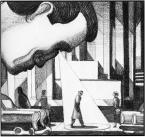For Vineyard writer and former social worker Michael Ditchfield, writing has always been a part of his life.
“I feel like I have done a 50-year apprenticeship with writing, and all of a sudden, things are starting to happen,” he said.
His upcoming true-crime novella, No Such Agency, recently won the William Faulkner-William Wisdom Writing Contest. The award will be presented at a conference in Louisiana later this month.
Mr. Ditchfield’s love for storytelling started at a young age. His father was a journalist for Reuters, stationed in London, Mexico and Washington D.C. Mr. Ditchfield spent his career as a therapist, and said that a lifetime of thinking about how people think was good training for writing.
No Such Agency takes place during the Cold War, where the main character, Mr. Lucky, is confronted with moral dilemmas due to his spy work. Mr. Lucky is a recurring character in Mr. Ditchfield’s novels.
The process of writing the novella changed throughout, according to Mr. Ditchfield.
“I actually thought originally that I would approach this with humor, which I actually do, but I really thought I was a humor writer,” he said. “As it evolved, I found that I have a darker side, and I think everybody probably does, and writing that down became, in a way, more interesting to me. I think we all need to face that darker side.”
Dialogue comes to Mr. Ditchfield first when crafting a narrative, drawing from his experience of being an active listener.
“Everybody has a story to tell, and it’s just a question of plugging into that place,” he said. “I listened to stories for so long and my writing process has been more to find a character or have the character find me and then just say, ‘go.’”
Secret government agencies and lost nuclear bombs form the settings of Mr. Ditchfield’s stories, but compassion and empathy add essential nuance to his plots and characters.
“For me, the fun about writing historical fiction and wrapping it around a really good story is that I can bring out these kinds of things in a way that feels organic,” he said. “It’s fun learning things from fiction.”







Comments (3)
Comments
Comment policy »